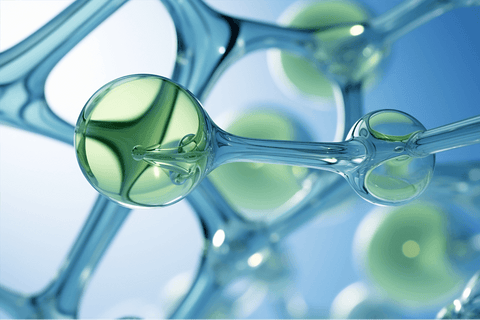Fisetin: A Comprehensive Guide to Its Benefits and Uses

Key Takeaways
- Fisetin is a flavonoid with potent antioxidant and anti-inflammatory properties.
- Research suggests fisetin may help slow the aging process and extend lifespan in animal models.
- Fisetin has been shown to protect brain health, support bone health, and offer potential benefits for skin and hair.
- Fisetin is found in various fruits and vegetables, with the highest concentrations in strawberries, apples, and persimmons.
- Incorporating fisetin-rich foods or supplements into your diet may provide a range of health benefits.
What is Fisetin?
Fisetin is a flavonol, a plant pigment that makes fruits and veggies colorful. It's often less known than other antioxidants like resveratrol and quercetin. But, recent studies have made people take notice of its health benefits, especially in fighting aging and increasing lifespan.
What is Fisetin and Why Should You Add It to Your Diet?
Fisetin is a strong antioxidant that helps fight inflammation and boost the immune system. It also protects the heart. Researchers are excited about its "senolytic" effect, which means it can remove harmful cells that build up with age.
These cells can lead to age-related diseases. By getting rid of them, fisetin could reduce inflammation and improve health, possibly even helping us live longer.
What is a Senolytic Cell?
Senolytic cells are old, non-working cells that cause inflammation. They pile up as we get older and can lead to many diseases. Scientists are looking for ways to get rid of these cells, and fisetin is a promising solution.
How Fisetin May Help to Stop Cells Becoming Senolytic
Studies show that fisetin can kill senescent cells without harming healthy ones. This could help reduce inflammation and slow aging. It also lowers senescence markers in different tissues, showing it could be a new way to fight aging.

Health Benefits of Fisetin
Fisetin is a natural compound found in fruits and veggies. It's getting a lot of attention for its health perks. Studies on animals and cells show it could help with aging and protect the brain. But, we need more human studies to be sure.
Fisetin Skin Benefits
Fisetin might be good for your skin. It could slow down enzymes that break down skin's structure. This means it might make skin look younger by keeping it firm and elastic.
Fisetin Benefits for Hair
Fisetin could also be good for your hair. It might help hair follicles grow stronger by supporting the bone they're in. This could mean healthier and thicker hair.
Fisetin and Bone Health
Fisetin might help keep your bones strong. It can make cells that build bone work better and stop cells that break bone. This could lead to stronger bones.
Does Fisetin Help to Protect Brain Health?
Some studies suggest fisetin could protect your brain. It can get into the brain and might help with memory and thinking. It could even help fight diseases like Alzheimer's.

Fisetin as an Antioxidant
Fisetin is a powerful antioxidant found naturally in our bodies. It fights off free radicals and helps make more antioxidants like glutathione and superoxide dismutase. This keeps our cells safe from harm caused by oxidative stress.
This antioxidant power of fisetin helps us in many ways, like fighting aging, reducing inflammation, and protecting our brains. Studies show it's great at stopping free radicals and reducing oxidative damage. This makes it a key natural way to stay healthy.
Fisetin's structure lets it tackle free radicals well. It has special groups that help it neutralize harmful oxygen species. It also turns on the Nrf2/ARE pathway, which helps our body make more antioxidants.
Eating foods high in fisetin, like strawberries and apples, or taking fisetin supplements can give us its benefits. This helps us stay healthy and feel good overall.
Fisetin and Cancer
Studies show that fisetin, a natural compound, might help fight cancer. It's found in fruits and veggies. Researchers look into its power to stop cancer cells from growing and spreading.
Fisetin and Lung Cancer
Studies on animals and cells show fisetin can slow down lung cancer cells. It does this by lowering inflammation and oxidative stress. These are factors that help lung cancer grow and spread.
Fisetin and Colon Cancer
Fisetin also stops colon cancer cells from growing in lab tests. It does this by messing with the signals that make these cells grow and survive. It also makes these cells die off.
Fisetin and Prostate Cancer
Fisetin has shown promise against prostate cancer cells. It slows down their growth and movement. This could be by changing the signals that help prostate cancer grow.
Fisetin and Pancreatic Cancer
Pancreatic cancer is tough to beat, but fisetin might help. Studies on animals show it can slow down pancreatic cancer cells. It does this by lowering inflammation and oxidative stress in the area around the tumor.
Fisetin and Melanoma
Fisetin looks good against melanoma, the worst skin cancer. In tests, it slowed down the growth, movement, and invasion of melanoma cells. This makes it a possible natural way to prevent and treat melanoma.
Studies on animals and cells suggest fisetin could fight many cancers, like lung, colon, prostate, pancreatic, and melanoma. But, we need more human studies to see if it works for people with cancer.
Fisetin and Longevity
Fisetin is getting a lot of attention for its potential to slow down aging and increase lifespan. Aging happens when cells stop dividing, get damaged, and release molecules that cause inflammation. Getting rid of these cells can reduce inflammation, improve health, and increase lifespan. A 2018 study found fisetin was the best at removing these cells among 10 plant compounds tested.
The Role of Fisetin in Aging and Longevity
Fisetin has shown great promise in extending lifespan in animal studies. It made yeast and fruit flies live longer by over 50% and 20% respectively. In mice, fisetin helped reduce aging markers and increased their lifespan. These findings suggest fisetin could slow aging and help people live longer, healthier lives.
Fisetin Eliminates Senescent Cells
Fisetin may help with longevity by getting rid of senescent cells. These cells are key to aging and age-related diseases. Fisetin was the top senolytic compound among 10 flavonoids tested, showing it can target and remove these harmful cells.
Fisetin versus Quercetin
Both fisetin and quercetin are flavonoids with antioxidant and anti-inflammatory effects. But fisetin seems better at clearing senescent cells and increasing lifespan in animals. Adding fisetin with galactomannans from fenugreek boosts its effectiveness by improving how well it spreads in the body.
Lifespan Extension Effects of Fisetin
Fisetin's effects on lifespan are impressive. Rodents given fisetin lived about 2.5 months longer, a 10% increase in lifespan. Even at the age of 75 years, fisetin increased rodents' lifespan by 10%. These results show fisetin's potential to support healthy aging and a longer life.
Fisetin Dosage and Supplementation
When adding fisetin to your health routine, knowing the right dosage and how to supplement is key. Fisetin is found in fruits and veggies, but you might not get enough from them. This is because the amounts in food might not match what studies show works best.
Fisetin Dosage
The best dosage of fisetin is still being studied. Some studies suggest taking about 100 mg a day. But, it's best to talk to a healthcare provider to find out what's right for you and your health goals.
Fisetin Supplements
You can also take fisetin as a supplement. When picking one, choose reputable brands with high-quality fisetin. Always follow the directions and talk to a healthcare professional before starting a new supplement.
How to Get More Fisetin in Your Diet
- Eat more strawberries, apples, persimmons, lotus root, onions, grapes, and kiwi.
- Try different recipes and cooking ways to get more fisetin from your food.
- Add fisetin-rich foods to smoothies, salads, or other dishes for easy intake.
Fisetin Foods
Fisetin is in many fruits and veggies, especially in strawberries, apples, persimmons, lotus root, onions, grapes, and kiwi. In Japan, people eat about 0.4 mg of fisetin daily on average. But, this might not be enough to get the benefits seen in studies.
Learning about the right dosage, supplement options, and eating fisetin-rich foods can help you support your health and well-being.
Potential Risks and Side Effects of Fisetin
Fisetin, a natural compound from plants, has shown great health benefits in studies. But, it's important to know its risks and side effects. Always talk to a healthcare professional before taking fisetin, especially if you have health issues or take other medicines.
Fisetin Benefits Dangers
Fisetin is usually safe, but some concerns exist. It might affect blood-thinning medicines because it can slow blood clotting. Also, it might not be well absorbed by the body, which could reduce its effectiveness.
Fisetin Side Effects
- Gastrointestinal discomfort: High doses of fisetin may irritate the stomach lining, leading to issues like nausea, bloating, or diarrhea.
- Allergic reactions: Some individuals may experience allergic responses, such as skin rashes, respiratory distress, or digestive problems when taking fisetin supplements.
- Hormonal imbalances: Fisetin may affect the balance of hormones like estrogen, testosterone, and thyroid hormones, which could have varying impacts on individuals.
- Liver function concerns: Long-term, high-dose fisetin supplementation may potentially impact liver function, requiring regular blood tests to monitor for any issues.
Be aware of these possible risks and start with small doses of fisetin. Ongoing research will help us understand fisetin's safety better. But for now, always consult with a healthcare provider to ensure your safety and address any concerns.
Conclusion
In conclusion, fisetin offers a range of potential benefits, from its antioxidant properties to its promising role in promoting healthy aging. With ongoing research revealing its powerful effects, incorporating fisetin into your wellness routine might be a smart move. For those seeking high-quality supplements and personalized health advice, visit Just-Glow. Discover how our curated products can support your journey to better health and vitality. Start your fisetin journey today and experience the benefits for yourself!
FAQ
What does fisetin do in the body?
Fisetin is a potent antioxidant that helps neutralize free radicals, supports brain health, promotes cardiovascular function, and may have anti-inflammatory properties.
Can I take fisetin every day?
Yes, fisetin is generally safe for daily consumption. It's advisable to follow recommended dosage guidelines to ensure safety and effectiveness.
What are the disadvantages of fisetin?
While fisetin is generally well-tolerated, excessive doses may cause mild gastrointestinal discomfort. It's wise to consult a healthcare professional before starting any new supplement regimen.
Can fisetin reverse aging?
Fisetin shows promising potential as a senolytic agent, which means it may help remove senescent cells associated with aging. Research on its anti-aging effects is ongoing.
Is fisetin bad for kidneys?
Current research suggests fisetin is safe for kidney health and may even offer protective benefits due to its antioxidant and anti-inflammatory properties. As always, consult your healthcare provider for personalized advice.
Summary
Have you heard of fisetin, a yellow pigment found in fruits and vegetables? It's gaining attention for its health benefits. Fisetin can help slow aging and fight inflammation. It's a natural compound with significant potential. But what exactly is it, and why should you include it in your diet? Let's explore the benefits of this plant-based molecule.





